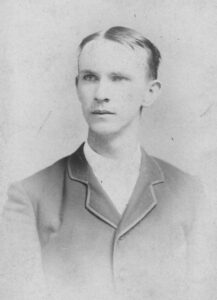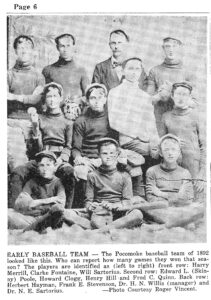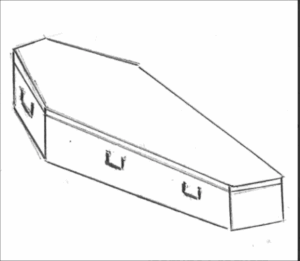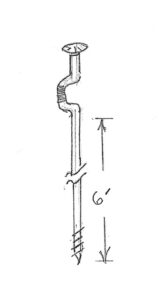Dr. Archibald W. “Moonlight” Graham of “Field of Dreams” fame did not play a half-inning of baseball for the Pocomoke City Salamanders of the Eastern Shore amateur league. And neither did Dr. Henry Noble Willis. But Doc Willis was the team manager in 1892, maybe longer. During his tenure, he was not involved in any time travel that we know of. His trips with the team seem to have been limited to neighboring towns in Worcester and surrounding counties. However, that travel just might have helped him find a second wife after the mother of his two young children died unexpectedly. But I am ahead of myself.
Back to the Beginning
Henry Noble Willis was born in Preston, Caroline County, Maryland on 23 Dec 1865.[1] He was baptized at age 20 months on 16 Aug 1867 at Hubbard Farm a few miles north of Preston.[2] The occasion was likely a Methodist revival or encampment of some sort. Ten children from several families were baptized at the event. Henry was the fourth child and only son of Dr. Henry F. Willis (1831-1890) and Emily Rumbold Patton (1836-1921). Two of his sisters died young — Cora (1857-1875) and Emma (1862-1863). Only Mary (1860-1941) lived well into adulthood.
The Noble Name
As noted in an earlier article Henry’s middle name seems to have been borrowed from a family highly regarded by the elder Dr. Willis rather than coming from a marriage between the two families. The most likely person is Twiford S. Noble.[3] Mr. Noble was a decade older than Henry F. Willis. Was he a mentor? Both were trustees of Bethesda Methodist Episcopal (now United Methodist) Church in Preston and were possibly friends before that.[4] When Twiford’s son Jacob graduated from medical school in 1876, Dr. Willis took him into his practice for a while before Jacob moved to Dorchester County and established his own practice.[5] Whatever the reason for its adoption, the Willis family has used Noble as a first or middle name for five generations of men beginning with Henry Noble Willis.[6]
Little is known of Henry’s early life in Preston. He attended local public schools and then Williamsport College (now Lycoming College) in Lycoming County, Pennsylvania. He then went to the University of Maryland College of Medicine in Baltimore, graduating in 1888 as a medical doctor.[7]

He had an obvious sense of humor. He wrote on the back of a photo taken while in medical school, “When you get sick, go have your picture taken. Be sure you are ugly a ton and break the camera at each sitting.”[8]
Moving On
Like his father, young Henry looked outside Caroline County to begin his medical practice. He went further south on the Delmarva Peninsula to Pocomoke City in Worcester County. At the time, Pocomoke City was more than ten times the size of Preston.[9] It makes sense that he opted for a location with more potential patients. The young doctor may have been invited to Pocomoke by Dr. John T. B. McMaster (1828-1889). He had graduated in 1850 from the same medical school and had become a prominent citizen of the region.[10] However, Dr. McMaster was apparently not in good health at the time. He died about a year after Henry arrived in Pocomoke City.[11] It is possible that Henry took over the elder doctor’s practice. Henry definitely was close to the McMasters. He and Mary E. McMaster, the youngest daughter of the family, married on 28 Oct 1890 at Beaver Dam Presbyterian Church in Pocomoke City.[12]
Henry and Mary had two children – Mary Catherine born 9 Jul 1891 and Harry McMaster born 27 Jul 1893.[13] Like Dr. McMaster, Henry’s father did not live to see the wedding or his grandchildren. The elder Dr. Willis died six months before the wedding. Young Henry went back to Preston to help administer his father’s estate along with his brother-in-law Joshua B. Clark.[14] (See this link). The elder Henry Willis had died intestate. Son Henry and his sister were each entitled to half the estate after their mother’s right to one third. Shortly thereafter, Henry purchased a house and lot on Second Street in Pocomoke City.[15] Mary McMaster Willis was also the beneficiary of an inheritance. Her father devised his half-acre homestead lot in Pocomoke City to his wife, who gifted the property to her four surviving children.[16] In 1893, the four divided the property with Mary and Henry Willis receiving a small part that contained an office building.[17]Henry may have established a drug store in the building. In 1896, he purchased soda fountain equipment of the type common in ice cream parlors or at drug store counters.[18]
Baseball
In addition to his medical practice and possibly running a drug store, Dr. Henry N. Willis managed the town’s amateur baseball team. An 1892 photo of the Pocomoke City baseball team with Dr. Willis as manager appeared in the local newspaper.[19]  Some team members appear to be high school students, others young adults. This was typical of the era – think “Field of Dreams” – when towns fielded amateur teams for friendly competition.[20] Other towns with teams in the Eastern Shore League included those nearby, such as Crisfield in Somerset County, and others some distance away, such as Cambridge in Dorchester County.[21] As the competition grew more intense, some towns employed “ringers” – semipro or college athletes – to bolster their teams. We do not know if Henry cheated in this manner. Had he managed long enough and were so inclined, however, he might have gotten help from “Moonlight” Graham. You see, Archie Graham also went to medical school at the University of Maryland graduating in 1905. He played several sports including baseball.[22] We can imagine that for a few bucks he might have caught a train from Baltimore to help out the Pocomoke City team, especially if asked by a doctor from the same school.
Some team members appear to be high school students, others young adults. This was typical of the era – think “Field of Dreams” – when towns fielded amateur teams for friendly competition.[20] Other towns with teams in the Eastern Shore League included those nearby, such as Crisfield in Somerset County, and others some distance away, such as Cambridge in Dorchester County.[21] As the competition grew more intense, some towns employed “ringers” – semipro or college athletes – to bolster their teams. We do not know if Henry cheated in this manner. Had he managed long enough and were so inclined, however, he might have gotten help from “Moonlight” Graham. You see, Archie Graham also went to medical school at the University of Maryland graduating in 1905. He played several sports including baseball.[22] We can imagine that for a few bucks he might have caught a train from Baltimore to help out the Pocomoke City team, especially if asked by a doctor from the same school.
Tragedy Followed by Good Fortune
The family suffered a devastating blow in 1898 when Henry’s wife died, leaving two children ages seven and five.[23] They were not without a mother for long. Henry remarried on 7 Sep 1899, less than a year after Mary’s death.[24] His bride was Jessie Sensor, the eighteen year-old daughter of Rev. George Guyer Sensor (1852-1913) and Julia Frances Mendenhall 1857-1941). The reverend was the Methodist minister of several churches in the region, conducting services in Pocomoke City and Crisfield in Maryland and Accomack in Virginia. We do not know how Henry and Jessie met. Possibly Jessie accompanied her father on his Sunday visits to Pocomoke. However, Henry’s affiliation through the McMaster family had been with local Presbyterian churches rather than Methodists. I like to think that they met because of his travels to Crisfield with the baseball team. In any event, they were married in Somerset County, so we can assume it was at the Crisfield Methodist Church with her father officiating.
It must have been quite a challenge for Jessie becoming the stepmother of two children, especially being only eleven years older than her stepdaughter! But that will have to wait for the second part of this story.
_____
[1] There is no birth certificate for Henry Noble Willis, and other evidence of his birth date is inconsistent. State of Delaware, Bureau of Vital Statistics, Certificate of Death #1274 states his birth date as 23 Dec 1866 and date of death as 11 Apr 1926. However, the 1900 Federal Census shows his birth as Dec 1865. That month and year is supported by his baptism on 16 Aug 1867 at age 20 months. His tombstone indicates birth in 1865.
[2] Methodist Episcopal Church Records, Dorchester District, 16 Aug 1867, Henry Noble Willis, parents Henry and Emily Willis, age 20 months, lived near Preston, by E.G. Irwin, at Hubbard Camp, http://www.collinsfactor.com/church/mec1866baptisms.htm
[3] Another Noble family, Isaac L. and his wife Mary E Noble, was a Willis neighbor in the 1870 census. I have not found any relationship between the Willises and Isaac Noble.
[4] Email 13 Jun 2012 with Dr. Eric Cheezum, historian at Bethesda Methodist.
[5] Jensen, Dr. Christian E., MD, Lives of Caroline County Maryland Physicians, 1774 – 1984, Printed by Baker Printing Company, Denton, Maryland, 1986, 118.
[6] They are Henry Noble Willis’s son Noble Sensor Willis, grandson Gary Noble Willis, great grandson Noble Sutherland Willis, and great-great grandson Christopher Noble Willis.
[7] U.S. College Student Lists, 1763-1924 on Ancestry, University of Maryland, 1891. At p 228, H. N. Willis, 1888, MD.
[8] Photo printed on front, Richard Walzh, 205 West Balto. Street, Baltimore, 477 Pennsylvania Avenue, Washington, DC
[9] https://www2.census.gov/library/publications/decennial/1900/bulletins/demographic/28-population-md.pdf. Pocomoke City population in 1900 was 2,124 versus 192 for Preston.
[10] U.S. College Student Lists, 1763-1924 on Ancestry, University of Maryland, 1891. At p 212, John T. B. McMaster, 1850, MD
[11] McMaster died 27 Aug 1889 per Find a Grave, https://www.findagrave.com/memorial/160117722/john_thomas_bayly_mcmaster
[12] Dryden, Ruth T., Lower Eastern Shore Maryland Marriages (including the counties of Somerset, Worcester, Wicomico) 1865-1906; Compiler and Publisher: Ruth T. Dryden, San Diego, CA, 1991, 527. Willis, Henry N, 24, McMasters, Mary E., 23, 28 Oct 1890, Wor.
[13] Social Security Death Index provides the birth date for each.
[14] Caroline County Administrations Key, online at Family Search, 169. Widow Emily P. Willis and daughter Mary W. Clark renounced their right of administration of the estate of Henry F. Willis. Letters of Administration granted to son Henry N. Willis and son-in-law Joshua B. Clark with bond of $5,000 and securities Jeremiah B. Fletcher and Robert Patton [GNW Note: Robert Patton is Emily’s brother]
[15] https://mdlandrec.net/main/. Worcester County, Maryland Deed Book FHP 1:116. 28 Sep 1890, Henry N Willis purchased for $350 from Samuel F Farlow et al a lot on the west side of Second Street with all improvements.
[16] https://mdlandrec.net/main/. Worcester County, Maryland Deed Book FHP 1:202. 25 Dec 1890, Elizabeth Grace McMaster (widow) conveys to her four named children for love and affection and $1.00 the McMaster Homestead lot, about a half-acre, between Market Street and Vine Street while retaining during her lifetime the right of use the property, including the right to lease but not mortgage it.
[17] https://mdlandrec.net/main/. Worcester County, Maryland Deed Book FHP 4:524. 1 Dec 1893, Harriet McMaster King and husband Herbert H. King of Pocomoke City, John S. McMaster of Jersey City, New Jersey, and Samuel B. McMaster of New York City sell to Mary E. Willis wife of Henry N. Willis for $1.00 the southwest part of the McMaster Homestead with 30 feet fronting on Market Street by about 100 feet deep. The lot contains an office building referred to in the boundary description of a lease recorded at FHP 8:548.
[18] https://mdlandrec.net/main/. Worcester County, Maryland Deed Book FHP 7:511, 1 May 1896, Henry N Willis purchased soda fountain equipment for $166.50 from Robert M Green & Sons of Baltimore.
[19] The photo appeared in the 1955 Anniversary Edition of the local newspaper, the “Worcester Democrat,” copy of the clipping in possession of the author.
[20] See, e.g., https://libapps.salisbury.edu/nabb-online/exhibits/show/friends-rivals-baseball-delmar/early-days-of-baseball-on-the-
[21] See https://en.wikipedia.org/wiki/Eastern_Shore_League. The amateur competition grew into a professional minor league in 1922.
[22] https://en.wikipedia.org/wiki/Moonlight_Graham
[23] Dryden, Ruth T., Cemetery Records of Worcester County, Maryland, reprint by Heritage Books, 2013, p. 202. Mary E. McMaster Willis died 19 May 1898 with burial in Pitt’s Creek Presbyterian Church Cemetery, Pocomoke City, Maryland.
[24] Dryden, Ruth T., Lower Eastern Shore Maryland Marriages (including the counties of Somerset, Worcester, Wicomico) 1865-1906; San Diego, CA, 1991, 527. Willis, Henry, 34 w(idower), Senser, Jessie, 18, 7 Sep 1899, Somerset.


 Her idea was to “drill down into some of the coffins to extract DNA.” Thus her nickname. She died not long thereafter, apparently not having succeeded with her DNA recovery project. If she had, any human DNA would undoubtedly have been mixed with pine tree DNA. Not sure if FTDNA could handle that.
Her idea was to “drill down into some of the coffins to extract DNA.” Thus her nickname. She died not long thereafter, apparently not having succeeded with her DNA recovery project. If she had, any human DNA would undoubtedly have been mixed with pine tree DNA. Not sure if FTDNA could handle that.